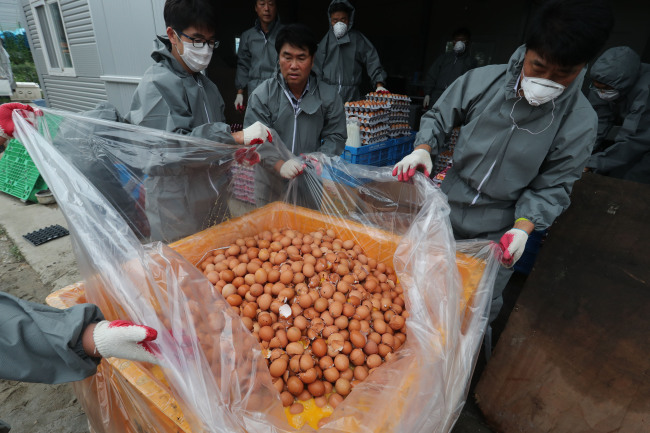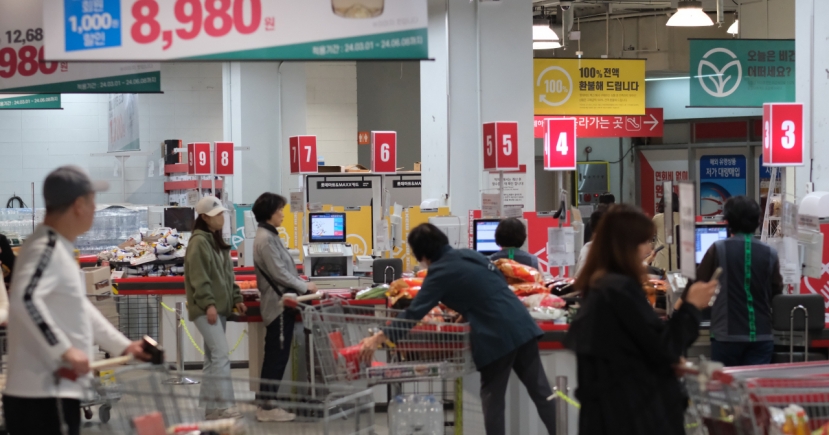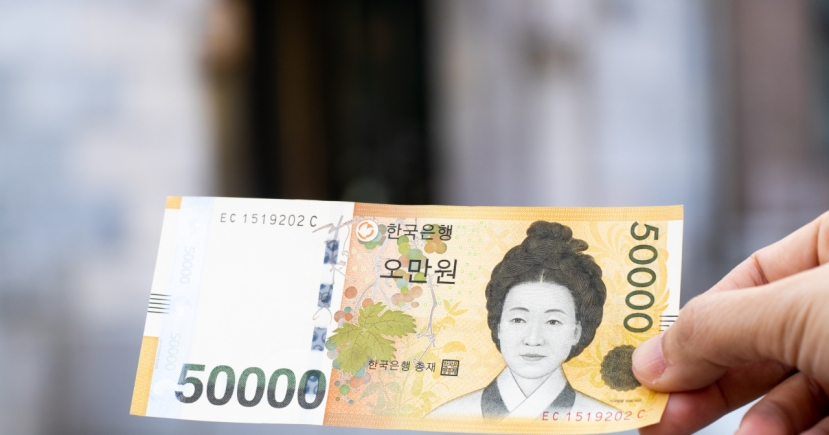Retail & Consumer
[Q&A] Fear of contaminated eggs spreads across Korea
[THE INVESTOR] Editor’s note: Fear is spreading among consumers as a scandal involving insecticide-contaminated eggs has surfaced in Europe and Asia. On Aug. 16, the South Korean government carried out the first round of inspections, banning all farms from distributing eggs from Aug. 15, after eggs from two local farms were found to be contaminated with pesticides earlier this week.
Though the Korea Food and Drug Administration has stated that the trace amount of fipronil and bifenthrin insecticides detected in the eggs at local egg farms are not life threatening, concerns are growing as little is known to the general public.
 |
Inspectors disposing eggs that have been contaminated at a farm in Namyangju. |
Below is the key Q&A for consumer safety.
Q: What effect does the fipronil have on the human body?
A: Fipronil is a potentially toxic substance used as an insecticide to eliminate fleas and ticks in dogs and cats. Under the Act on the Mutual Aid Related to Animals in Animal Health, the substance cannot be used on animals consumed by humans such as cattle, chickens, and pigs. Since the use of the product in food is strictly prohibited, there are currently no detection mechanisms or standard regulations in place. The World Health Organization warns that high doses of fipronil may damage organs such as the liver, kidneys and thyroid glands. When fipronil enters the body, a person will experience symptoms such as vomiting, abdominal pain, and dizziness. In addition, if the toxin is constantly accumulated in the body, it can destroy the internal organs that responsible for ridding the body of toxins.
Q: What about bifenthrin?
A: Bifenthrin is a substance classified by the US Environmental Protection Agency as a carcinogen. The use of the substance is not completely banned as it is used as an insecticide to eliminate ticks in chickens. However long-term exposure may adversely affect the human body, which is why the substance is heavily regulated.
Q: Are the pesticides residues only on the shell of the eggs? Is it safe to simply just wash the outside and consume it?
A: There are two main reasons why insecticides might be detected in eggs. The first is that chickens are constantly exposed to pesticides, which cause toxic substances to accumulate in the skin and in the body that inevitably affect the eggs. The second instance is when the farmers directly spray the chicken coop with pesticides. In this case the insecticide is likely to only be on the outer surface of the egg, which is not eaten and would have little to no effect on the human body. However, the Korea Food and Drug Administration states that extra precaution should still be made when consuming such eggs.
Q: Is it safe to consume chicken?
A: To answer the question directly, the current insecticide issue is unrelated to chickens used for meat, as the breeding environment for broiler chickens and laying hens are very different. Because laying hens are kept for long periods of time inside the coop, they are more likely to acquire ticks, which is why the pesticides are used. Broiler chickens, on the other hand, are kept on flat ground and the breeding periods are 30 to 40 days shorter. This makes it unnecessary to spray them with pesticides, as it is a difficult environment for ticks to parasitize. In addition, when transferring chickens, inspection and disinfection are thoroughly carried out, making it difficult for contamination to occur.
Q: What are the differences between laying hens and broiler chickens?
A: A laying hen is a chicken that specializes in laying eggs. According to the Ministry of Agriculture, Forestry and Livestock Foods, laying hens usually lay eggs from 20 to 80 weeks of age. Hyline brown and Lohmann brown are among the main varieties of lying hens. On the other hand, broiler chickens are bred specifically to be eaten. Most of the chickens that are sold and consumed on the market are broiler chickens, though there are some rare cases where laying hens are used for consumption as they become infertile. However, according to industry experts, the meat-to-body-mass ratio of broiler chickens is much higher and older laying hens have a less pleasant texture than broiler chickens, which is why laying hens are only used in processed meat. In addition, until now, there have been no harmful substances detected as a result of random tests on these chickens.
Q: How many pesticide eggs have been distributed for public consumption, and where are they?
A: According to the Korea Food and Drug Administration, there are four wholesalers who distributed the problematic eggs, and distribution and sales by these suppliers have been shut down. According to the Ministry of Agriculture and Fisheries, two farms where insecticide-tainted eggs were found have had 80,000 and 60,000 laying hens, respectively. In the farm in Namyangju, the production of eggs per day was about 25,000, meaning about 150,000 eggs had been produced over the six days where toxic levels have been found. It has been estimated that at least 100,000 of these eggs have been distributed on to the market. The Food and Drug Administration plans to dispose of all related eggs when the inspection results are not satisfactory. In addition eggs that are deemed contaminated at large-scale marts and retail stores will also disposed.
Q: Is it safe to consume eggs that have already been purchased?
A: The Korea Food and Drug Administration believes that the amounts of insecticide currently detected are not harmful to humans. According to the United Nations Food and Agriculture Organization (FAO) and the World Food Organization’s international food standard, Codex, the fipronil residue standard for eggs is 0.02 mg per kilogram. The amount of fipronil detected in the eggs of the poultry farm in Namyangju, Gyeonggi Province was 0.0363mg. The bifenthrin residue standard for eggs is 0.01 mg per kilogram and the amount of bifenthrin detected in Gwangju Poultry Farm was 0.0157 mg. The Food and Drug Administration’s stance is that though both findings exceed the standard amount, it should have little to no effect on young healthy adults. However, they are still toxic chemicals, and could be harmful to infants, elderly, and patients. According to the administration, the eggs distributed from the two farms where the problem was mentioned are printed with a label that reads ‘08’ or ‘08 LSH’ on the shells. If purchased eggs bear these bar codes, it is likely that they have been contaminated.
Q: Is it possible to get a refund for eggs that have already been purchased?
A: E-Mart, Home Plus, Lotte Mart, and other large marts have decided to refund customers for eggs that were purchased to protect consumers’ safety. Regardless of the point of purchase, you can bring a receipt and submit it to the mart for a refund.
By Alex Lee (alexlee@heraldcorp.com)






![[KH Explains] Korean shipbuilding stocks rally: Real growth or bubble?](http://res.heraldm.com/phpwas/restmb_idxmake.php?idx=151&simg=/content/image/2024/04/25/20240425050656_0.jpg)
![[Hello India] Hyundai Motor vows to boost 'clean mobility' in India](http://res.heraldm.com/phpwas/restmb_idxmake.php?idx=151&simg=/content/image/2024/04/25/20240425050672_0.jpg)
